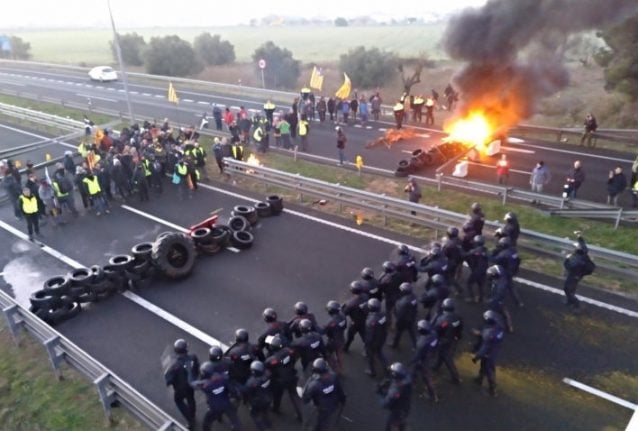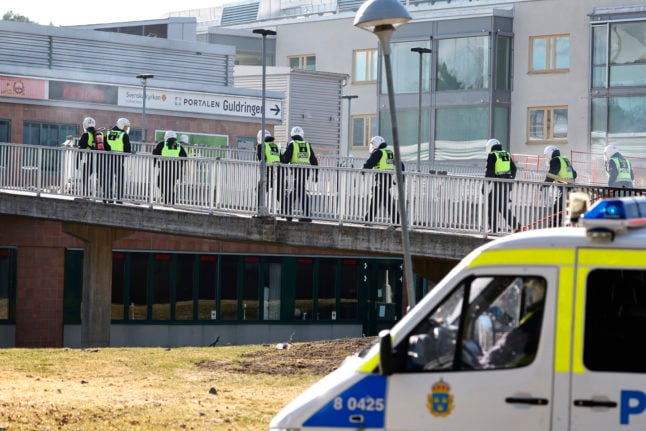Police beating Catalan strikers in the A2 highway near Tarrega #VagaGeneral21F pic.twitter.com/YGPf674HGT
— Help Catalonia ? (@CataloniaHelp2) February 21, 2019
Traffic authorities in the northeastern region said they had cut off around 20 roads, including the A7 highway that links Spain to France, the A2 between Madrid and Barcelona and the main entry points to the Mediterranean city.
Som-hi!! #21FVagaGeneral pic.twitter.com/zfTtY2oPHI
— Albert Trilla ? (@AlbertTrilla) February 21, 2019
READ MORE: Catalan separarists' trial: What you need to know
Police cleared several of the road blocks and detained two protesters, a spokesman said.
Activists also briefly blocked train traffic by occupying the tracks at a station in Barcelona and in other parts of the region, according to the company that manages Spain's rail network.
#21FVagaGeneral Olot pic.twitter.com/XTlVwmgML2
— monika lliure (@bellido_monika) February 21, 2019
At midday, hundreds protested in the central University Square, where the city's oldest university stands, and another demonstration is planned for the evening.
“We're here in solidarity with those who are victims of a trial that just doesn't hold water,” said Jaume Sole, a 45-year-old engineer.
The one-day strike has been called by Intersindical CSC, a small pro-independence union, to protest against the trial of 12 separatist leaders that opened last week at Madrid's Supreme Court.
#21F a #Badalona: Tall de trànsit a la sortida de la C31, al barri de Sant Roc. pic.twitter.com/kr2a2CvOf9
— Badalona Comunicació (@bdncom) February 21, 2019
The union has the support of separatist parties and associations, but not of the other bigger unions.
Tall a la C-31, a l’alçada de #Badalona ✊?! Avui fem #21FVagaGeneral, perquè sense drets no hi ha llibertat!#AutodeterminacioNoÉsDelicte pic.twitter.com/jXcB8xanQP
— RepúblicaBDN ? #21FVagaGeneral (@republicaBDN) February 21, 2019
La manifestació avança lliure per Creu Coberta seguida d'aprop dels (anti)avalots. #VagaGeneral21F #VagaSants pic.twitter.com/de5Mh5nD85
— La Burxa (@laBurxa) February 21, 2019
Police beating Catalan strikers in Terrassa #HelpCatalonia #VagaGeneral21F pic.twitter.com/E6HJt4Tz9D
— Help Catalonia ? (@CataloniaHelp2) February 21, 2019
The Catalan employers' association, meanwhile, has denounced the work stoppage as politically-motivated.
The region's separatist government has expressed solidarity with the strike and cancelled all official events planned for Thursday.
The trial of 12 Catalan separatist leaders and activists, nine of whom are accused of rebellion, started on February 12th under intense domestic and foreign scrutiny.
They are being tried for pushing an independence referendum in October 2017 in defiance of a court ban, and for a subsequent short-lived declaration of independence on October 27th.
Catalonia's former president Carles Puigdemont, who fled for Belgium soon after, is not among the defendants as Spain doesn't judge people in absentia for major offences.
READ ALSO: Spain's King Felipe speaks out during Catalan separatists' trial



 Please whitelist us to continue reading.
Please whitelist us to continue reading.
Member comments